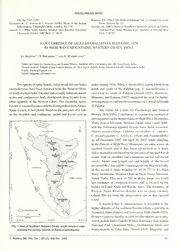
Occurrence of Salea Anamallayana Beddome, 1878 in High Wavy Mountains, Western Ghats, India PDF
Preview Occurrence of Salea Anamallayana Beddome, 1878 in High Wavy Mountains, Western Ghats, India
MISCELLANEOUS NOTES UK. Pp. 2187-2194. Roberts,T.J. (1992):TheBudsofPakistan. Vol. 2. OxfordUniversity Grimmett R., C. Inskipp & T. Inskipp (1998): Birds of the Indian Press,Oxford. Pp. 221. Subcontinent. ChristopherHelm, London. Pp. 739. Sharma, M. (2007): Bristled GrassbirdChaetornisstriatus in Corbett Inskipp, T. (1996): Little known Oriental bird: Bristled Grassbird National Park, India. BirdingAsia - Bulletin ofOriental Bird Chaetornisstriatus. OBCBull. 23: 46-47. Club 7: 90-91. 9. OCCURRENCE OFSALEAANAMALLAYANA BEDDOME, 1878 IN HIGH WAVY MOUNTAINS, WESTERN GHATS, INDIA G. Srinivas1-3. S. Bhupathy1-4andA. Madhivanan2 'SalimAliCentreforOrnithologyandNaturalHistory,Anaikatti (PO),Coimbatore641 108,TamilNadu, India. :PresentAddress:WildlifeCrimeControlBureau, 11,AirCargoComplex,Sahar, Mumbai400099,Maharashtra, India. 3EmaiI: [email protected] 4Email: [email protected] Twospeciesofspinylizards.SaleahorsfieldiiandSalea males(Smith 1935).WhileS. horsfieldiiisreportedbothfrom anamallayana, have been reported from the Western Ghats north and south of the Palghat gap, S. anamallayana is ofsouth-westernIndia.Unequalandstronglyimbricatedorsal restricted to south of Palghat (Smith 1935). However, scales and compressed body distinguish these lizards from Bhupathy and Kannan ( 1997) suggestedthe needforfurther other agamids of the Western Ghats. The Anamalai Spiny investigationstoconfirmtheoccurrenceofS. horsfieldiisouth Lizard, S. anamallayanacouldbedistinguishedfromNilgiri ofPalghat. Spiny Lizard, S. horsfieldii based on the presence ofa fold The Salim Ali Centre for Ornithology and Natural on the shoulder, and continuous nuchal and dorsal crest in History (SACON), Coimbatore is conducting ecological investigationsontheherpetofaunaofHighWavyMountains, Theni Forest Division, Western Ghats since April 2006, and the following agamid lizards have been recorded; Sitana ponticeriana, Calotes versicolor, C. calotes, C. grandisquamis, C. rouxii C. elliotti and Psammophilus , sp. till December 2007. OnApril 20, 2007, while sampling inthe Plateau ofHighWavy Mountains, we came across an agamid lizard and it has been identified as a male Saleaanamallayanabasedonthepresenceofunequaldorsal scales, fold on shoulder and continuous nuchal and dorsal crests. Snout-vent length and tail length of the lizard mm mm measured40.2 and60.3 respectively.Preciselocality of this record is upper Manalar (9°36' N; 77°21' E), High Wavy Mountains, Western Ghats in Theni Forest Division, Tamil Nadu. This area (1,700 m above mean sea level) has remnants of evergreen forests, and is located on the border of Tamil Nadu and Kerala states. The boundary of Periyar Tiger Reserve, Kerala was in close vicinity (about 500 m) from the observation site of this agamid lizard. It reported that S. anamallayana is restricted to the higheraltitudesofthe southernWestern Ghats,especially in Anamalai,Palni Palani andTravancoreHills(Smith 1935). ( ) However,preciselocality recordsforthis speciesarescanty, whichincludeIndiraGandhiWildlifeSanctuary,Eravikulam Fig. 1: Map of Southern Western Ghats, south-western India National Park (Anamalai Hills), Mathikettan Shola and showingthe locality recordsof Saleaanamallayana Mariyanshola in Palm Hills (Smith 1935; Bhupathy and 1 Bombay Nat. Hist. Soc., 105 (3), Sep-Dec 2008 341 MISCELLANEOUS NOTES Kannan 1997; Bhupathy and Nixon 2004, Fig. 1). Even ACKNOWLEDGEMENTS though,thepresentlocalitylieswithinthegeneralTravancore Hills, itisperhaps, the onlypreciselocality recordavailable Thispaperisanoffshootoftheresearchproject(F.No. for this species south ofAnamalai and Palni Hills, and is 23/5/2004-RE) sponsoredby theEasternandWesternGhats about 50 km (in straight line) from the nearest known site programme of the Ministry of Environment and Forests, (i.e. Mathikettan shola). This record also indicates the Government ofIndia. We are grateful to the ChiefWildlife possibility ofthe occurrence ofS. anamallayana in Periyar Warden,TamilNaduandMr. SrinivasReddy, DistrictForest Tiger Reserve, Kerala and on other hill tops such as Officer, Theni Forest Division, for permission to undertake Agasthiayamalai located further south. Further intensive thisstudy.HelprenderedbyR.SuganthanSakthivelofKerala surveys may yield new locality records and insights on Forest Research Institute, Peechi, in preparing the map is the distribution pattern of this rare and endemic agamid highly appreciated. We thank the Director, SACON, for species. facilities providedandencouragement. REFE1 4CES Bhupathy,S.&P.Kannan(1997):StatusofagamidlizardsintheWestern ForestDepartment.SalimAliCentreforOrnithologyandNatural Ghats ofTamil Nadu. SACON Technical Report 5. Salim Ali History,Coimbatore. 15 pp. CentreforOrnithologyandNaturalHistory,Coimbatore.28pp. Smith.M.A. (1935):TheFaunaofBritishIndia,includingCeylonand Bhupathy,S. &A.M.A. Nixon(2004): StatusofreptilesinEravikulam Burma: ReptiliaandAmphibia. Volume II.Taylorand Francis, NationalPark,Kerala,India.FinalReportsubmittedtotheKerala London,United Kingdom.440pp. 10. RECORDS OF ERYXJOHNII (RUSSELL, 1801) (OPHIDIA: BOIDAE) AND ECHIS CARINATUS (SCHNEIDER, 1801) (OPHIDIA: VIPERIDAE) FROM THE THAR DESERT, RAJASTHAN, INDIA, WITH DISTRIBUTIONAL NOTES ON OTHER SNAKES BikramjitSinha1 and R.C. Sharma2 'G.B. PantInstituteofHimalayanEnvironment&Development,NorthEastUnit,Itanagar791 113,ArunachalPradesh,India. Email: [email protected] -DesertRegionalStation,ZoologicalSurveyofIndia, PaliRoad,Jodhpur342005,Rajasthan,India. DuringthecourseofaroutinesurveyoftheTharDesert (Sharma 1996; Bhide et al. 2004). However, a look at their of Rajasthan, as a part ofthe assessment of impacts of the district-wise distribution reveals that they are not uniformly IndiraGandhiNaharProjectonbiodiversity,twosnakes,Eryx distributed. MaximumconcentrationoccursinJodhpurdistrict jolmii and Ecliis carinatus, were encountered. Indian Sand (15 species), whilenotasingle specieshasbeenreportedfrom BoaEryxjolmiiwasobservedat2245hrsonAugust 15,2000, Barmer, Churu, Ganganagar, Hanumangarh, Jalore and in an agricultural field nearthe Desert National Park (DNP) Jhunjhunu districts. In our opinion, as all the 13 districts of guest house at Sudansari, Jaisalmer. The venomous Saw- western Rajasthan lie within the TharDesert and have similar scaled Viper Echis carinatus was observed at 2150 hrs on environmentalconditions,60-70%ofthesnakespeciesrecorded August 17,2000,inahardrockyareawithsparsevegetation, intheTharDesertmaybepresentinallthedistricts.Thepresent c. 8 km towards Barmer on the road from Jaisalmer. statusofreportmaybeduetothebiasednatureofearliersurveys. The subspecies status of this reptile was not determined, Thus, thereexistsplentyofscope in thedistributional study of i.e.,whetherthesnakewasEchiscarinatuscarinatusorEchis snakeswithin all 13districtsoftheTharDesert. carinatus sochureki (some taxonomists consider the two to Previously,theIndianSandBoahasbeenreportedfrom be distinct species-Echiscarinatusand Echissochureki). two districts and the Saw-scaledViperfromfive districts of Amarkeddifferenceinbehaviourwasobservedbetween western Rajasthan (Table 1). The present report adds to the thetwospecies.The IndianSand Boaonbeingdisturbedwas existingknowledgeofdistributionofsnakefaunainJaisalmer notaggressive,insteadittriedtoescape.TheSaw-scaledViper district oftheTharDesert, Rajasthan, India. on theotherhand, adoptedadefensiveposture. ACKNOWLEDGEMENTS Both the snake species have been reported to occur throughout the dry arid regions of India. The Thar Desert covers 13 districts of western Rajasthan. So far, a total of We thank the anonymous referees for their critical 20 snake species have been reported from the Thar Desert comments on the earlierversion ofthemanuscript. 342 J. Bombay Nat. Hist. Soc., 105 (3), Sep-Dec 2008
